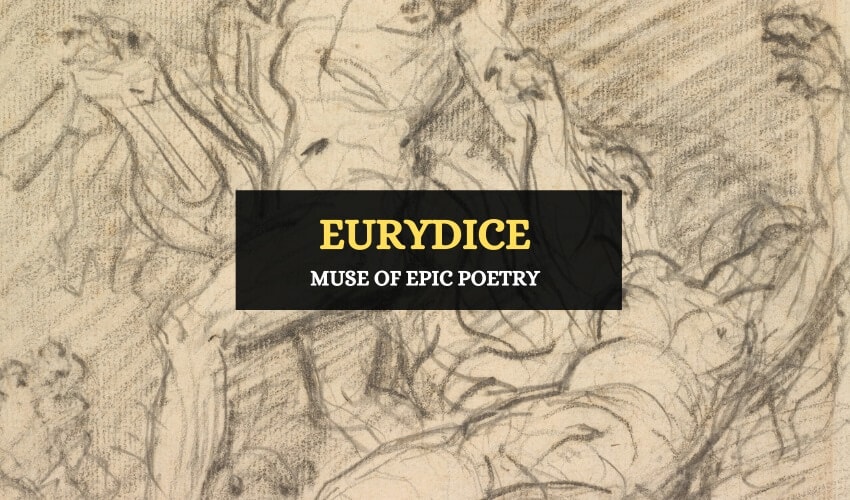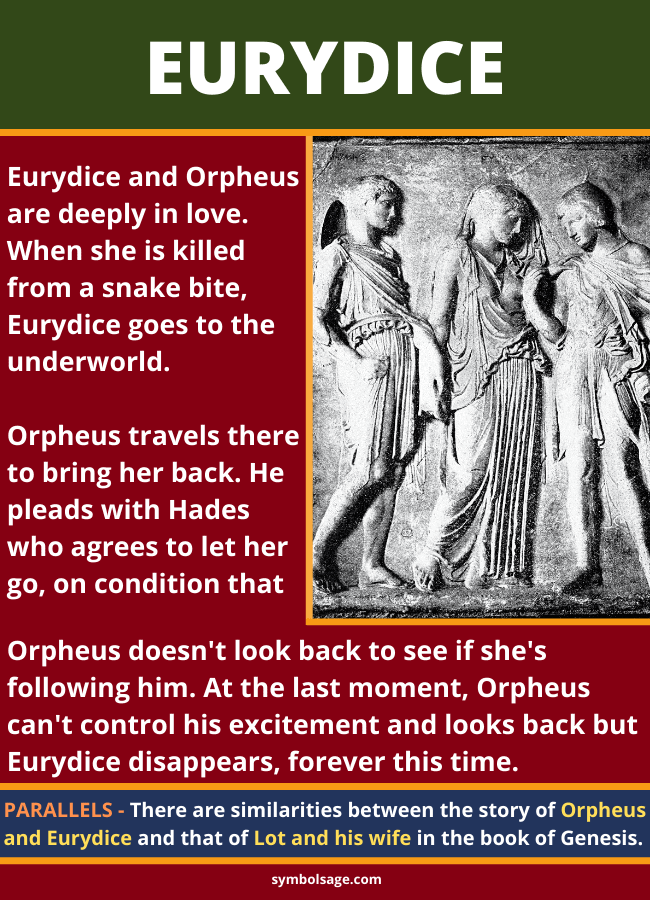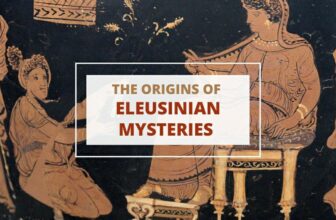
Table of Contents
In Greek mythology, Eurydice was the lover and wife of Orpheus, a talented musician and poet. Eurydice died a tragic death, but her beloved Orpheus journeyed all the way to the Underworld to get her back. The myth of Eurydice has several parallels in Biblical stories, Japanese tales, Mayan folklore and Indian or Sumerian lore. Eurydice’s’ myth has become a popular motif in contemporary movies, artworks, poems and novels.
Let’s take a closer look at the story of Eurydice.
Origins of Eurydice
In Greek mythology, Eurydice was either a woodland nymph or one of the daughters of God Apollo. There isn’t much information on her origins, and she was thought to be a later addition to pre-existing Orpheus myths. Greek writers and historians have deduced that Eurydice’s story was reformulated and reinvented from an older narrative of Orpheus and Hecate.
Eurydice and Orpheus

- Eurydice meets Orpheus
Eurydice encountered Orpheus when he was singing and playing his lyre in the forest. Orpheus was surrounded by animals and beasts who were enchanted by his music. Eurydice listened to his songs and fell in love with him. Orpheus reciprocated Eurydice’s feelings, and the couple were united in a picture-perfect wedding. During the wedding ceremony, Orpheus composed his most beautiful tunes and watched Eurydice dance.
- Eurydice meets disaster
Although nothing seemed amiss, Hymen, the god of marriage, predicted that their happy union wouldn’t last. But Eurydice and Orpheus didn’t heed his words and carried on with their blissful life. Eurydice’s fall came in the form of Aristaeus, a shepherd who fell in love with her charming looks and beauty. Aristaeus spotted Eurydice strolling in the meadows and began to pursue her. While running away from him, Eurydice stepped into a nest of deadly snakes and was poisoned. Eurydice’s life couldn’t be saved, and her spirit journeyed into the Underworld.
- Orpheus goes to the Underworld
Orpheus lamented the loss of Eurydice by singing sad melodies and composing melancholic songs. The nymphs, gods and goddesses were moved to tears, and advised Orpheus to journey into the Underworld and retrieve Eurydice. Orpheus heeded their guidance and entered the gates of the Underworld, by enchanting Cerberus with his lyre.
- Orpheus doesn’t follow instructions
The Underworld deities, Hades and Persephone were moved by Orpheus’ love, and promised to return Eurydice to the land of the living. But for this to happen, Orpheus had to follow one rule and not look back until he reached the upperworld. Although it was a seemingly easy task, Orpheus was weighed with perpetual doubt and uncertainty. When he almost reached the top, Orpheus looked back to see if Eurydice was following him and if the Gods were true to their words. This proved to be Orpheus’ gravest mistake, and at his glance, Eurydice vanished into the Underworld.
Although Orpheus tried re-negotiating with Hades, it wasn’t possible for the god of the Underworld to give him another chance. But Orpheus didn’t have to mourn for too long, as he was murdered by the Maenads, and reunited with Eurydice in the Underworld.
Other Versions of Eurydice’s’ Myth
In a lesser known version of the Eurydice myth, she gets banished to the Underworld after dancing with Naiads on her wedding day.
Many gods and goddesses were angry with her immoral behavior, but were more frustrated with Orpheus, who didn’t give up his life in order to join her in the Underworld. They disapproved of Orpheus’ negotiation with Hades, and only showed him a vague apparition of Eurydice.
Although this version of the Eurydice myth is not popular, it asks several critical questions that enables a more nuanced understanding of the myth.
Cultural Representations of Eurydice
There are many plays, poems, novels, films and artwork based on the myth of Eurydice. The Roman poet Ovid, in Metamorphosis wrote an entire episode detailing the death of Eurydice. In the book The World’s Wife, Carol Ann Duffy has reimagined and retold the myth of Eurydice from a feminist perspective.
The tragic myth of Eurydice has also been an inspiration for operas and musicals. Euridice was one of the earliest Opera compositions, and Hadestown reinvented the Eurydice myth in the form of a modern folk-opera. The myth of Eurydice also featured in several movies such as Orphée directed by Jean Cocteau, and Black Orpheus, a film that reimagined the Eurydice myth from the perspective of a taxi driver.
Over the centuries, numerous artists and painters have drawn inspiration from the Eurydice myth. In the painting Orpheus and Eurydice, artist Peter Paul Rubens has depicted Orpheus journeying out of the Underworld. Nicolas Poussin has painted the Eurydice myth in a more symbolic manner, and his painting Landscape with Orpheus foreshadows the doom of Eurydice and Orpheus. Contemporary artist, Alice Laverty has reimagined the Eurydice myth and given it a modern twist by incorporating a young boy and girl in her painting Orpheus and Eurydice.

Eurydice and Lot’s Wife – Similarities
The myth of Eurydice is similar to the story of Lot in the Book of Genesis. When God decided to destroy the cities of Sodom and Gomorrah, he provided an alternative option to the family of Lot. However, while leaving the city, God instructed Lot and his family not to turn around and witness the destruction. Lot’s wife, however, couldn’t resist the temptation and turned back for once last glance at the city. As she did this, god turned her into a pillar of salt.
The myth of Eurydice and the story of Lot both narrate the consequences of disobeying a higher power. The Biblical story of Lot may have been influenced by the earlier Greek myth of Eurydice.
Eurydice Facts
Eurydice’s parentage is unclear, but her father is said to be Apollo.
Eurydice marries Orpheus.
The story of Eurydice and Orpheus teaches us to be patient and have faith.
Eurydice is bitten by venomous snakes as she runs away from Aristaeus pursuing her.
In Brief
Eurydice has one of the saddest love stories in all of Greek mythology. Her death was caused by no fault of her own, and she couldn’t remain united with her lover for long. Though Eurydice was a victim of unfortunate circumstances, it’s for this very reason that she has become one of the most popular tragic heroines in Greek mythology.








